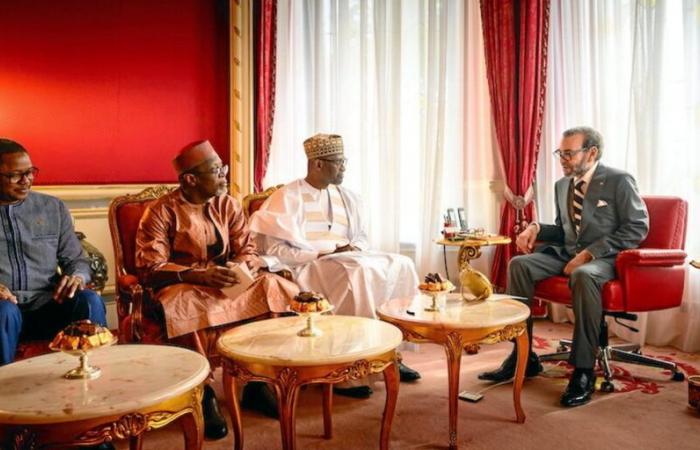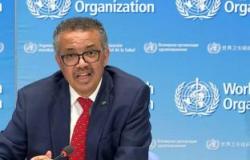ABefore the strong political gesture, the signals had been clear: the launch of the Atlantic initiative, a discreet mediation during the release of hostages in Burkina Faso, and repeated calls for South-South solidarity. This April 28, welcoming the Sahelian Ministers of Foreign Affairs in Rabat, King Mohammed VI gave a more assertive turn to his diplomacy. The message is clear: Morocco now claims its place at the heart of the Sahelian game.
A discreetly deployed Sahelian strategy
In a Sahel crossed by the coups d’etat, the ruptures of alliances and the distance from the former Western partners, Morocco has established itself, since 2022, as a pragmatic actor, focusing on dialogue with transitional regimes.
The turning point? On November 6, 2023, on the occasion of his annual speech on the Sahara, King Mohammed VI unveiled the Atlantic initiative. The objective: to offer a lasting sea outlet to landlocked Sahelian countries based on Moroccan ports, from Dakhla to Tangier Med. The project, described by a Western diplomat stationed in Rabat as “a rare African initiative thought outside of Western frameworks”, immediately found echo in Ouagadougou, Bamako and Niamey.
For the countries of the Alliance of the States of the Sahel (AES), diplomatically isolated since their withdrawal from ECOWAS and faced with international sanctions, this outstretched hand represents both an economic buoy and an implicit political recognition. The ministers Abdoulaye Diop (Mali), Karamoko Jean-Marie Traoré (Burkina Faso) and Bakary Yaou Sangaré (Niger), who presented the progress of the Alliance of the Sahel (AES) alliance during the visit of April 28 in Rabat, unanimously insisted on “total adhesion” of their countries at the initiative of the Chérifian sovereign to promote Access from the Sahel countries to the Atlantic, as well as their “commitment to accelerate its implementation”. This project, which is added to the Nigeria-Maroc pipeline, confirms Rabat’s desire to play a pivotal role on the continent.
“I must say that I was impressed by three facts,” said Burkinabé Minister Karamoko Jean-Marie Traoré at the microphone of Moroccan channels. “The first is His Majesty’s love for Africa and Africans. The second is his perfect knowledge of our countries and the sub-region. And the third is his great availability to co -construct new reports with his African brothers. It was something very touching for us. »»
But, behind this rhetoric of solidarity, it is a renewed Moroccan doctrine that takes shape. A high -ranking Moroccan diplomatic source summarizes it as follows: “It is not a classic influence game. Morocco is positioned as a facilitator and mediator, in a logic of block alliances, no domination. A formula that contrasts with the more muscular approaches of certain traditional partners of the Sahel, be it France yesterday or Russia today. This posture also allowed Rabat to play a discreet but decisive role in the release of four agents of the French DGSE in Burkina Faso, as we reported in December 2024.
The kingdom has activated credible information and negotiation channels without ever seeking to capture the light. This capacity of intermediaries contributes to establishing an image of active neutrality with few African actors can claim in the area.
Morocco, new referee in the Sahel?
Where Algiers had been considered, for decades, as the natural interlocutor of the Sahel-in particular via the joint operational staff (CEMOC) or mediation in the 2015 Algiers peace agreement-, Morocco was able to move the lines. By cultivating local diplomacy, embodied at the top by Mohammed VI but also relayed by investment agencies, the Mohammed VI Foundation or even public logistics operators, Rabat has filled a strategic void.
This new influence materializes in multilateral forums, where Moroccan and Algerian diplomats have long won an attrition war on formulations. Thus, on the United Nations or African Union resolutions linked to the Sahel, Algiers argued for only the “interested parties and the country of the area”. Rabat militated for a more inclusive formula: “parties concerned, interested, and country of the Sahelian field”. A detail? Not really.
Indeed, Sahelian diplomacy is often played with a comma and adjective. Whoever imposes his terminology imposes his legitimacy. In 2025, Moroccan semantics seems to have been a school. The recent texts of the G5 Sahel dissolved, like those of the informal summit of AES in Niamey in March 2025, resume the terminology advocated by Rabat.
To discover
The kangaroo of the day
Answer
Another indicator of this rocking: the multiplication of bilateral visits to Rabat not only diplomats but also Sahelian sectoral ministers (economy, agriculture, infrastructure), who have come to seek partnerships, models and funding. In the long term, this repositioning could create positive externalities for the Kingdom: opening new markets for Moroccan companies, diplomatic support on the Sahara file and above all increased influence on regional security.
But Rabat advances with caution. Because the area remains unstable and the Sahelian transitional regimes are fragile. Aware of this volatility, Moroccan diplomacy continues to keep a distance from military logics and refuses to line up with external powers, whether Russian, Turkish or Western. This bet of positive neutrality, if it succeeds, could make Morocco a central actor not only in the Sahel but, more broadly, in the interafican dialogue of tomorrow. Mohammed VI intends to register this strategy over time, as the Sahelian balances are redrawing. As a adviser close to the palace sums it up, who requested anonymity: “The king does not want to be a principal, but a donor of solutions. »»








